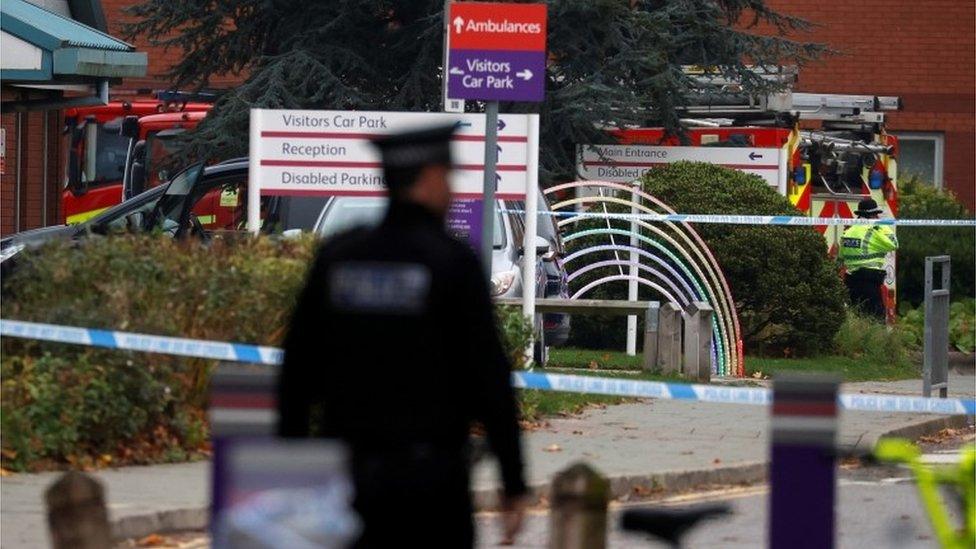Liverpool bomb: What we know so far
- Published
Watch: The cab pulled up outside Liverpool Women's Hospital and exploded into flames
A man who was killed outside Liverpool Women's Hospital on Remembrance Sunday when his homemade bomb went off has been identified as 32-year-old Emad Al Swealmeen.
He was an asylum seeker born in Iraq who is understood to have converted to Christianity in 2017.
Al Swealmeen was the passenger of the taxi destroyed in the blast. The driver, David Perry, did not suffer life-threatening injuries.
Four men were arrested under the Terrorism Act, but have since been released from police custody without charge.
What happened?
Merseyside Police were called at 10:59 GMT on 14 November to reports of a car explosion at Liverpool Women's Hospital.
The taxi carrying Al Swealmeen had pulled up to the hospital and exploded shortly afterwards.
Al Swealmeen, who had been picked up from the Rutland Avenue area and asked to be taken to the hospital about 10 minutes away, died at the scene.
Watch: Police say passenger brought explosive device into taxi
On Monday Assistant Chief Constable Russ Jackson, head of Counter Terrorism Policing North West, said the passenger appeared to have made an improvised device that caused the explosion.
He said officers investigating the incident could not "at this time draw any connection" with Remembrance Sunday events taking place near the hospital but he confirmed this was "a line of inquiry".

Taxi driver David Perry has been discharged from hospital and his wife Rachel said it had been "an utter miracle" that he had escaped from the vehicle.
Mr Jackson said he could not confirm reports Mr Perry had locked the doors of the taxi before the explosion.
He said it appeared to have been an "unremarkable journey" to the hospital.
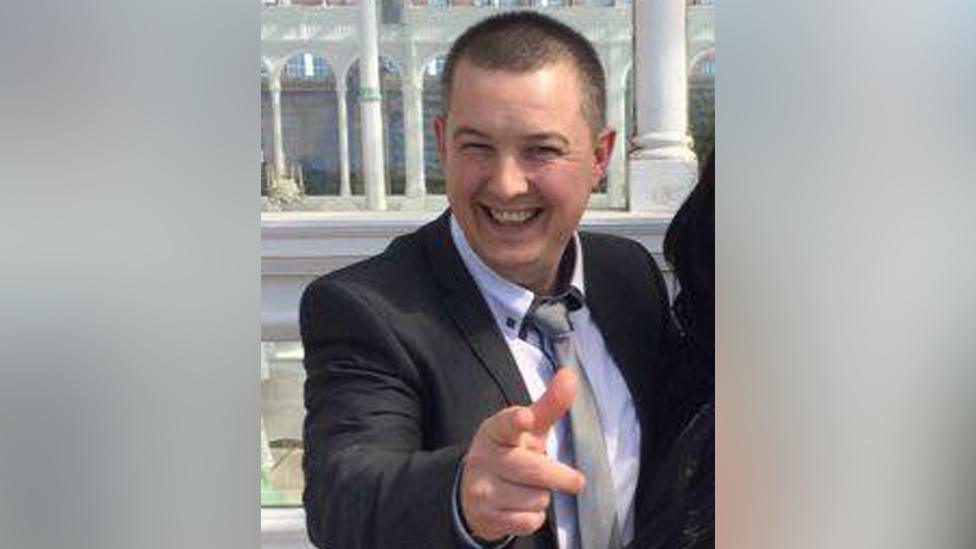
Taxi driver David Perry has been discharged from hospital
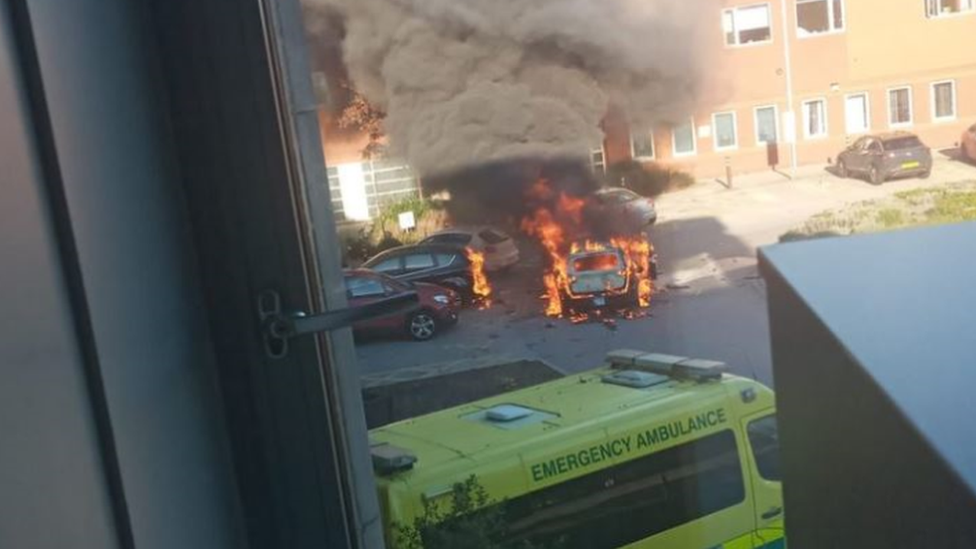
Pictures of a burning car outside the hospital have been widely shared on social media
What happened afterwards?
About two hours after the blast, properties on Rutland Avenue near Sefton Park, in the south-east of the city, and in the Kensington area, east of the city centre, were raided by armed officers.
Three arrests took place in Sutcliffe Street, in Kensington, where witnesses reported seeing armed officers approach a terraced house.
The second raid around Sutcliffe Street and the adjacent Boaler Street - about a mile from the hospital - took place an hour later, at about 14:00 GMT.
There was a heavy police presence, including police negotiators, outside the house on Rutland Avenue overnight.
Police confirmed a controlled explosion had been carried out as a precaution in the Sefton Park area at about 16:00 GMT as part of the investigation but there was no wider risk to the public.
Mr Jackson said officers had made "significant progress" and had a "much greater understanding of the component parts of the device, how they were obtained and how the parts are likely to have been assembled".
He said following interviews with the arrested men, police were "satisfied with the accounts they have provided" and they were released from custody.
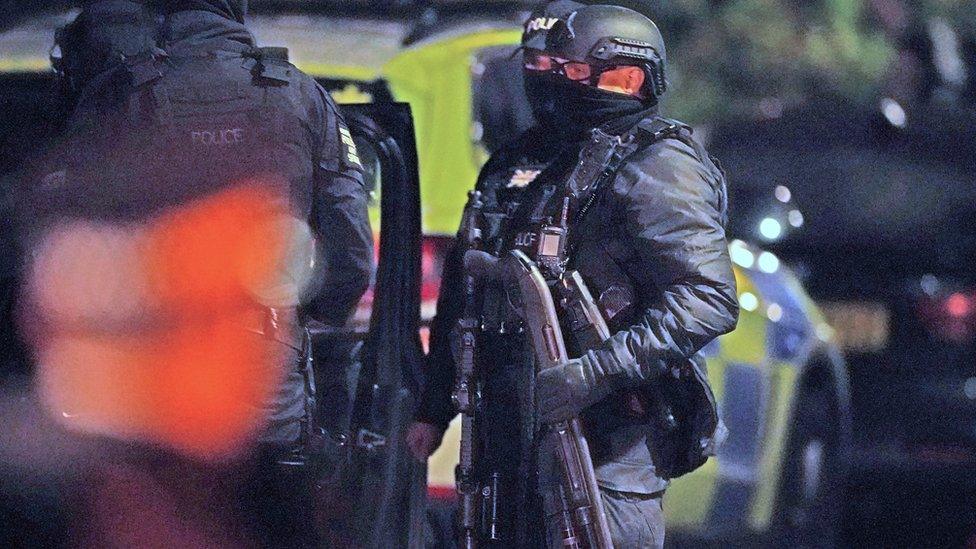
Specialist officers were seen on Rutland Avenue
How is the investigation unfolding?
The wreckage of the taxi was removed on Wednesday and specialist officers were expected to continue searches at the hospital into Thursday, said Mr Jackson.
A post mortem on Al Swealmeen found the cause of death to be "injuries sustained from the fire and explosion", he said.
Police have traced his next of kin who told them he was born in Iraq.
"Our inquiries have found that Al Swealmeen has had episodes of mental illness, this will form part of the investigation and will take some time to fully understand," said Mr Jackson.
He said they had not found any link to others in the Merseyside area but could not yet rule it out.
Nick Aldworth, a former counter terror co-ordinator, said investigators would be focused on what happened inside the vehicle.
"I have to say from what I've seen there is very little blast damage - a lot of fire damage but very little blast damage. So whatever was in that vehicle was either a low yield or didn't work properly or was possibly an incendiary."
What is known about the bomber?
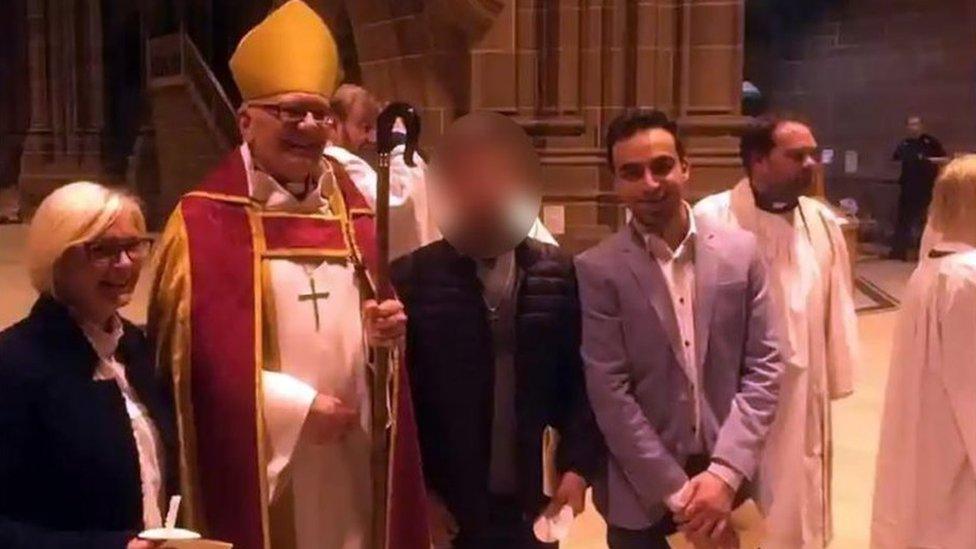
Emad Al Swealmeen during a service at Liverpool's Anglican Cathedral, alongside Bishop Cyril Ashton
Al Swealmeen began making purchases for his attack in April, counter-terror police said.
Mr Jackson said the bomber had lived at a property in Sutcliffe Street for some time. And he began renting a property in Rutland Avenue in April.
Police recovered "significant items" from his latest address, where searches have been taking place since Sunday.
Al Swealmeen is not believed to have been known to MI5, according to BBC security correspondent Gordon Corera.
One of the members of his tribe in Jordan told the BBC that Al Swealmeen was Jordanian, but born in Iraq. His family settled in the United Arab Emirates in 1996.
Al Swealmeen left for Syria 12 years ago, then headed to Turkey, eventually applying for asylum by claiming he was Syrian.
The tribe member - who knows Al Swealmeen's father - said the attacker had a history of mental illness.
Immigration records seen by the BBC show Al Swealmeen was first refused asylum in the UK in 2014. He challenged the decision, but in April 2015 a judge ruled the Home Office had been correct.
In June 2015 he launched an attempt to overturn that decision, but that application was refused in August 2015 by the Upper Tier Tribunal - the court dedicated to immigration appeals.
At that stage the case appears to have been closed - and by 2017 friends of Al Swealmeen in Liverpool understood his legal avenues had been exhausted.
Whether the Home Office ordered him to leave the UK is not clear.
During this period he turned to Christianity and became known locally as Enzo Almeni, a name he adopted as part of his conversion.
Court records show that he then renewed his immigration appeal - under this alternative name - in January this year. His submissions were under review at the time of his death.
What have those who knew him said?
A Christian couple, Elizabeth and Malcolm Hitchcott told ITV News that Al Swealmeen briefly lived with them, external at their Liverpool home after his conversion to Christianity.
Mr Hitchcott described him as a "very quiet fellow" who formally converted from Islam at a ceremony in Liverpool's Anglican Cathedral.
Al Swealmeen is believed to have been baptised in 2015 and confirmed in 2017 - before the cathedral lost contact with him in 2018, according to the Diocese of Liverpool's communication's director, Stuart Haynes.
The Reverend Mike Hindley said Al Swealmeen was involved in the Emmanuel Church in the Fazakerley area of Liverpool from 2017 to 2019, when they lost touch with him.
A spokesman for the City of Liverpool College said Al Swealmeen was an adult cake decorating student at the college during the 2018-2019 academic year.
In the years before the attack, Al Swealmeen was sectioned under the Mental Health Act for about six months because of his behaviour with a knife, Mr Hitchcott said.
Al Swealmeen was described as a "lovely guy" by Mrs Hitchcott, who told the BBC "we just loved him", adding she was saddened and "very shocked" by Sunday's incident.

Did you witness what happened? Email haveyoursay@bbc.co.uk, external.
Please include a contact number if you are willing to speak to a BBC journalist. You can also get in touch in the following ways:
WhatsApp: +44 7756 165803
Tweet: @BBC_HaveYourSay, external
Please read our terms & conditions and privacy policy
If you are reading this page and can't see the form you will need to visit the mobile version of the BBC website to submit your question or comment or you can email us at HaveYourSay@bbc.co.uk, external. Please include your name, age and location with any submission.
Related topics
- Published15 November 2021
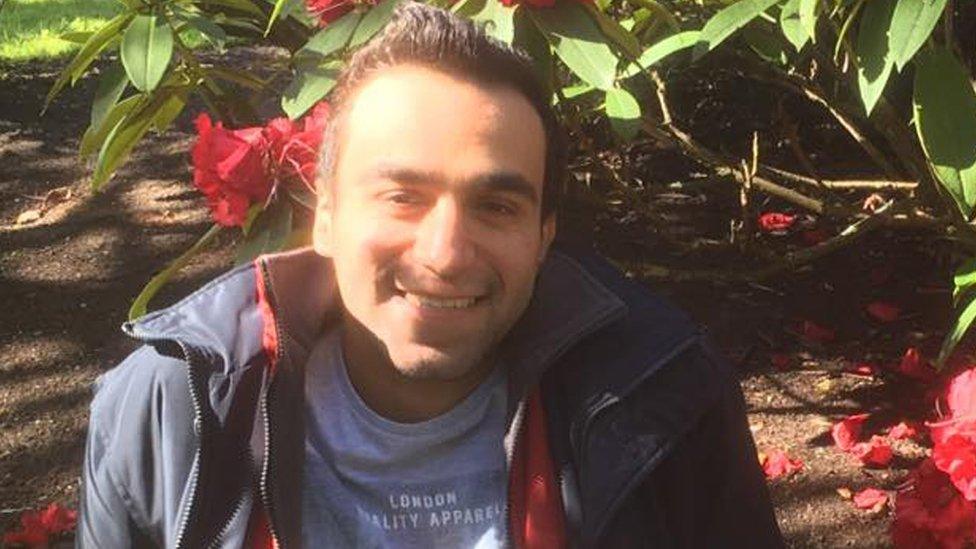
- Published15 November 2021
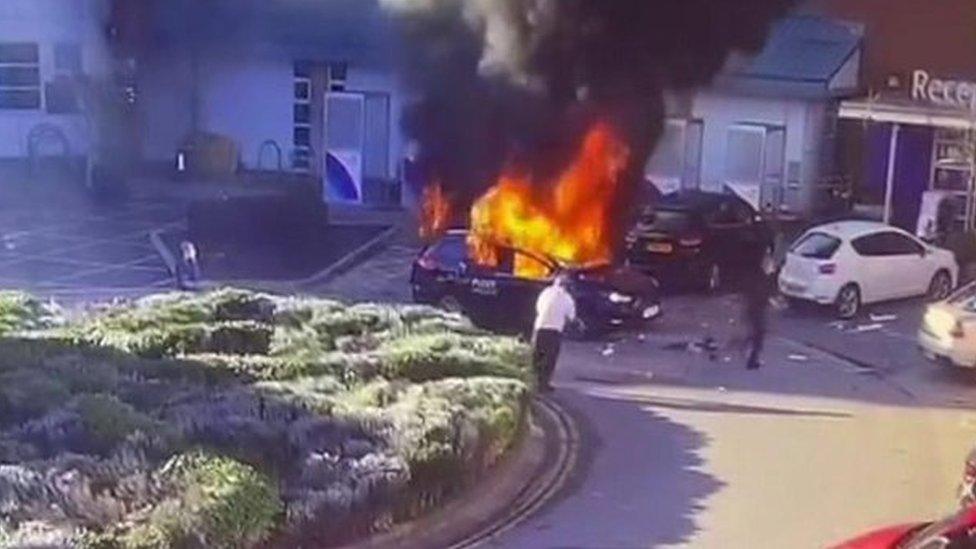
- Published15 November 2021
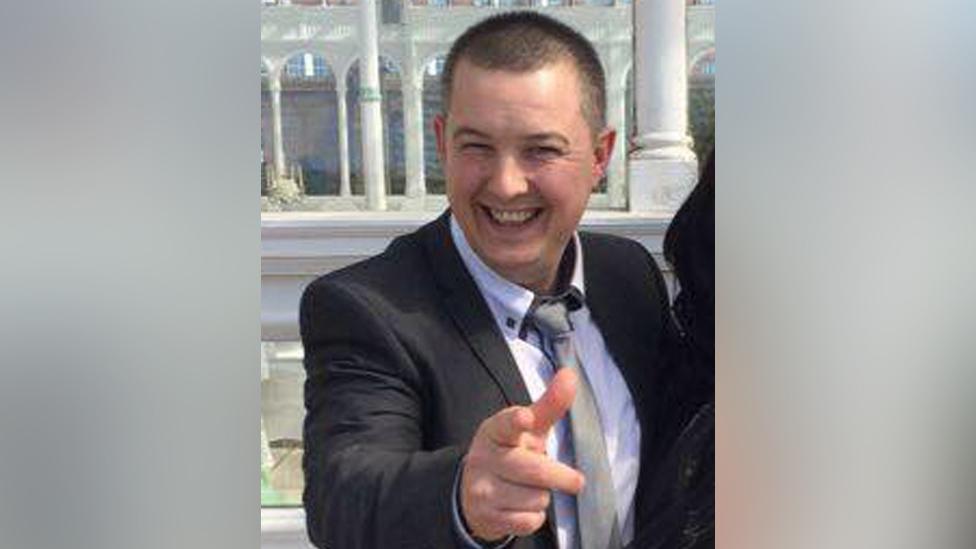
- Published15 November 2021
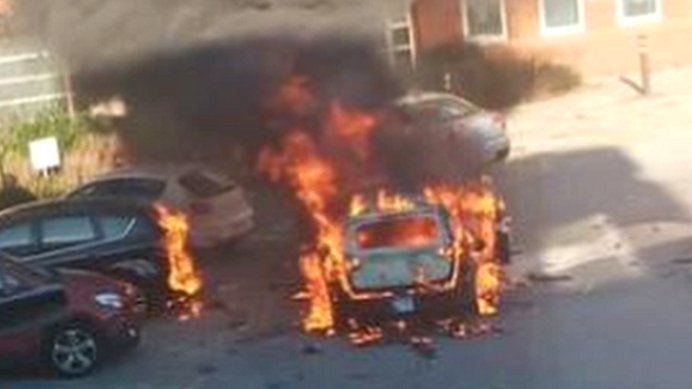
- Published14 November 2021
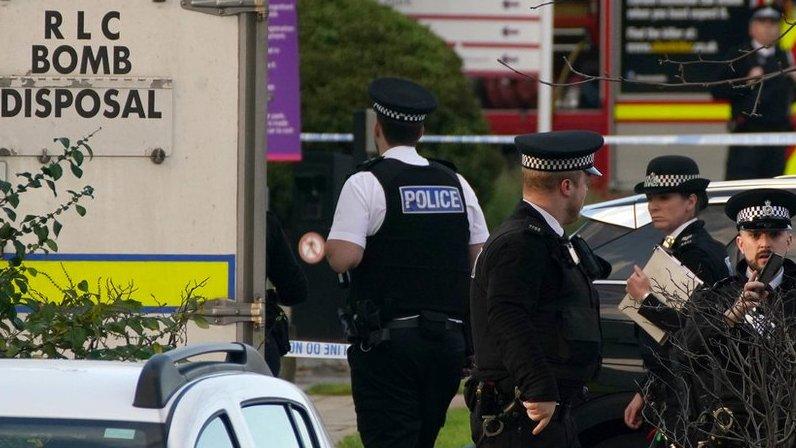
- Published15 November 2021
